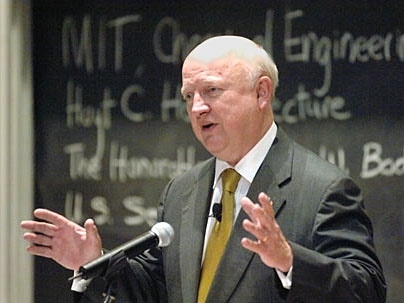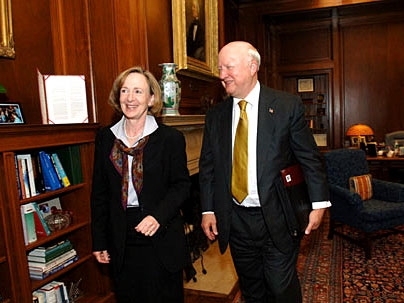Ethanol made from corn cobs, other agricultural waste and switchgrass will provide up to 5 percent of all motor fuel used in the United States by 2007 and 25 percent by 2012, if the Bush administration has its way, U.S. Secretary of Energy Samuel W. Bodman told an MIT audience on Tuesday, May 9.
Bodman said that while cost-effective methods of producing biofuels are still under development, and incorporating ethanol into the petroleum-based motor fuels infrastructure will be "a massive job," the push is on to increase domestic ethanol production because the United States needs to decrease its dependence on foreign energy sources.
"This country needs a locally grown source of motor fuel. There's a general sense in Congress that we have a lot of incentives to get the industry up and running," he said.
Bodman spoke at the Hoyt C. Hottel Lecture sponsored by the Department of Chemical Engineering and the Energy Research Council. A 1965 MIT graduate, Bodman was an MIT associate professor of chemical engineering before going on to a career as a financier and executive at Fidelity Investments. He was sworn in as energy secretary in 2005.
Bodman said high prices at the pump are on everybody's mind and that the current administration will oppose additional gasoline taxes. "Working families are already struggling under high prices," Bodman said. "I don't think (they're) likely to see enthusiasm for increasing gas prices even higher."
The $23 billion budget of the U.S. Department of Energy will undergo major reshuffling if the Bush administration succeeds in getting its proposed changes through Congress, Bodman told a packed audience in the Stata Center. While the overall annual budget will not increase, Bodman said the part of the budget devoted to alternative fuels, hybrid vehicles, solar and wind energy, fuel cells and coal as a clean fuel source will increase 22 percent in fiscal 2007.
Nuclear power must play a larger role as a future energy source, Bodman said, and building the new plants to increase its role will take years and cost billions of dollars. The Bush administration has asked Congress for $250 million in 2007 to launch the Global Nuclear Energy Partnership to help meet growing global energy demand, but a repository for nuclear waste needs to be found, and nuclear waste needs to be reduced overall and made less radioactive to pave the way for a new generation of plants.
No new nuclear plants have been built in the United States in 30 years, but six new plants may be up and running by 2015. "We need six new reactors, we need 16, we need 46, but that will only happen if we deal with the question of spent fuel," Bodman said.
A version of this article appeared in MIT Tech Talk on May 17, 2006 (download PDF).







